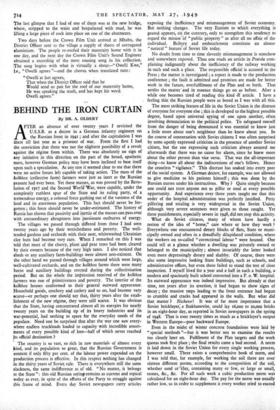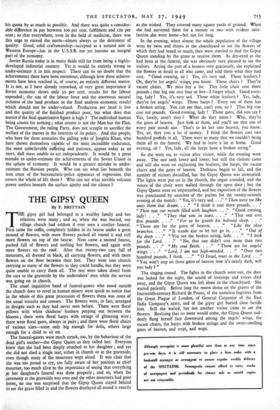BEHIND THE IRON CURTAIN
By DR. A. OLDERT
AFTER an absence of over twenty years I revisited the U.S.S.R. as a doctor in a German infantry regiment on the Russian front in 1941 ; and after the capitulation I was there till last year as a prisoner of war. From the first I had the conviction that there was not the slightest possibility of a revolt against the regime from within. There was absolutely no sign of any initiative in this direction on the part of the broad, apathetic mass, however German policy may have been inclined to base itself upon such a speculation. At any rate it seemed clear to me that there were no active forces left capable of taking action. The mass of the kolkhoz (collective farm) farmers were just as inert as the Russian peasant had ever been. Yet these masses, as was proved by the Revo- lution of 1917 and the Second World' War, were capable, under the completely ruthless spur of the State and its ruling party, of a tremendous energy, a colossal force gushing out of the vastness of the land and its enormous population. This fact should never be for- gotten ; this force should never be under-estimated. The history of Russia has shown that passivity and inertia of the masses can pass over with extraordinary abruptness into passionate outbursts of energy.
The villages we passed through differed from those I had seen twenty years ago by their wretchedness and poverty. The well- tended gardens and orchards with their neat, whitewashed Ukrainian day huts had become very rare. When I remarked on this I was told that most of the cherry, plum and pear trees had been cleared by their owners because of the very high taxes. I also noticed that sheds or any auxiliary farm-buildings were almost non-existent. On the other hand we passed through villages around which were large, well-cultivated orchards, and on the kolkhoz farms there were many barns and auxiliary buildings erected during the collectivisation period. But on the whole the impression received of the kolkhoz farmers was one of primitiveness and poverty. The interior of the kolkhoz houses conformed to their general outward appearance. Household goods, crockery and cutlery and so on, had become very scarce—or perhaps one should say that, thirty years after the estab- lishment of the new regime, they were still scarce. It was obvious that the State, having concentrated almost all its energies for nearly twenty years on the building up of its heavy industries and its war-potential, had nothing to spare for the everyday needs of the populace. Need one be surprised that after the war one saw every- where endless truckloads loaded to capacity with incredible assort- ments of every possible kind of loot—half of which never reached ilts official destination ?
The country is so vast, so rich in raw materials of almost every kind, and its population so great, that the Russian Government is content if only fifty per cent. of the labour power expended on the production process is effective. In this respect nothing has changed in the thirty years of Soviet rule. There is everywhere still the same slackness, the same indifference as of old. " No matter, it belongs to the State ": this old Russian sayint remains as current and topical today as ever, in spite of the efforts of the Party to struggle against this frame of mind. Every day Soviet newspapers carry articles exposing the inefficiency and mismanagement of Soviet economy. But nothing changes. The very Etatism to which everything is geared appears, on the contrary, only to strengthen this tendency to regard the misuse of "public property" as after all no affair of the individual. Bribery and embezzlement constitute an almost " natural " feature of Soviet life today.
No doubt from time to time slovenly mismanagement is somehow and somewhere exposed. Thus one reads an article in Pravda corn-. plaining indignantly about the inefficiency of the railway working in such and such a place. The responsible official is accused in the Press ; the matter is investigated ; a report is made to the production conference ; the fault is admitted and promises are made for better work in the future, overfulfilment of the Plan and so forth. That settles the matter and in essence things go on as before. After a while one becomes tired of reading this kind Of article. I have a feeling that the Russian people were as bored as I was with all this.
The most striking feature of life in the Soviet Union is the distrust of everyone for everyone else ; this is developed to the highest possible degree, based upon universal spying of one upon another, often involving denunciation to the political police. To safeguard oneself from the danger of being denounced it was essential to know just a little more about one's neighbour than he knew about you. In the course of conversation with Soviet citizens I was often surprised by some openly expressed criticism in the presence of another Soviet citizen, but the one expressing such criticism always assured me afterwards that there was no cause for alarm, since he knew more about the other person than vice versa. That was the all-important thing—to know all about the indiscretions of one's fellows. Hence the ceaseless " vigilance." This distrust has soaked into every pore of the social system. A German doctor, for example, was not allowed to give medicine to his patients himself ; this was done by the Russian nurses under his instructions. Why ? Quite simply because one could not trust anyone not to pilfer or steal at every possible opportunity. And experience over three years taught me that this order of the hospital administration was perfectly justified. Petty pilfering and stealing is very widespread in the Soviet Union, although very severe sentences were given to those caught. Yet these punishments, especially severe in 1948, did not stop this activity.
What do Soviet citizens, many of whom have hardly a notion of the idea of " home," care where or how they work ? Everywhere one encountered dreary blocks of flats, State or muni- cipally owned and often in a dreadfully dilapidated condition, where the workers on so-called " correctional labour " were housed. One could tell at a glance whether a dwelling was privately owned or belonged to the municipality ; almost invariably the latter looked even more depressingly dreary and shabby. Of course, there were also some impressive looking State buildings, such as schools, and administrative offices, but even these failed to stand the test of close inspection. I myself lived for a year and a half in such a building, a modern and spaciously built school converted into a P. o. W. hospital. Its outward appearance was indeed impressive. But already at that time, ten years after its erection, it had begun to show signs of decay ; the massive steps leading to the front entrance had begun to crumble and cracks had appeared in the walls. But what did that matter ? Nichevo! It was of far more importance that a Soviet bricklayer; a Stakhanovite, could lay 16,000 to 20,000 bricks in an eight-hour day, as reported in Soviet newspapers in the spring of 1948. That is over twenty times as much as a bricklayer's output in Western Europe—poor backward Europe.
Even in the midst of winter concrete foundations were laid by " special methods "—but it was better not to examine the results too closely later on. Fulfilment of the Plan targets and the work quotas took first place ; the final results came a bad second. A norm is laid down in the Soviet Union for every single working process, however small. There exists a comprehensive book of norm, and I was told that, for example, for working the soil there are over sixteen different norms, according to the composition of the soil, whether sand of tOay, containing many or few, or large or small, stones, &c., &c. For all such work a cubic production norm was calculated for an eight-hour day. The pay for the norm was usually rather low, so in order to supplement it every worker tried to exceed his quota by as much as possible. And there was quite a consider- able difference in pay between too per cent. fulfilment and rzo per cent.; so that everywhere, even in the field of medicine, there was this urge to exceed the norm—almost always to the detriment of quality. Good, solid craftsmanship—accepted as a natural aim in Western Europe—has in the U.S.S.R. not yet become an integral part of the economy.
Soviet Russia today is in many fields still far from being a highly- developed industrial country. Yet it would be entirely wrong to under-estimate it in this respect. There can be no doubt that the achievements there have been enormous, although how these achieve- ments have been reached is, of course, an entirely different matter. It is not, as I have already remarked, of very great importance if Soviet economy shows only 5o per cent. results for the labour expended ; the size of the labour force and the enormous natural richness of the land produce in the final analysis economic results which should not be under-valued. Production per head is low and the quality of the finished product poor, but what does that matter if the final quantitative figure is high ? The individual human being counts for nothing ; what counts is not the Man but the Plan. The Government, the ruling Party, does not scruple to sacrifice the welfare of the masses in the interests of its policy.. And this people, who, bore for three centuries the galling yoke of jenghiz Khan, who have shown themselves capable of the most incredible endurance, the most unbelievable suffering and patience, appear today as an inert, dull mass unable to act independently. It would be a great mistake to under-estimate the achievements of the Soviet Union in the sphere of economy. It would be a greater mistake to under- estimate the Russian people. Who can say what lies beneath the iron crust of the bureaucratic-police apparatus of repression that covers the whole of life there ? Who can say what terrible volcanic power seethes beneath the surface apathy and the silence ?







































 Previous page
Previous page